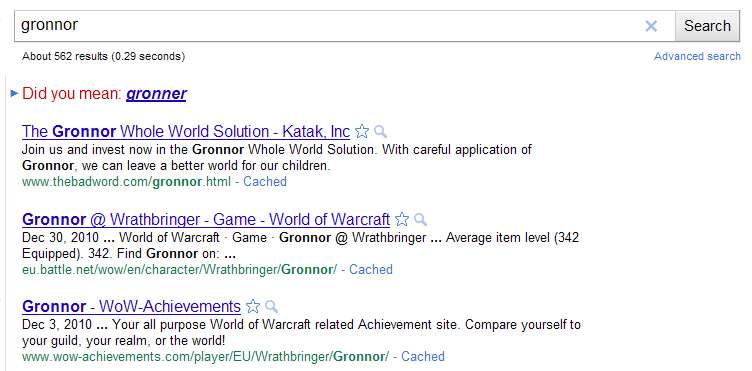 A lot of very clever people have spent a lot of time trying to create an equation that will judge how likely you are to rank well for a keyword, and how attractive that keyword is, based on a number of factors ranging from your site’s PageRank and backlinks to the number of people searching for the keywords to the amount of competition for those keywords. The idea is to take every factor into account. This is the SEO equivalent of the unified field theorem, the great white whale of SEO mathematics.
A lot of very clever people have spent a lot of time trying to create an equation that will judge how likely you are to rank well for a keyword, and how attractive that keyword is, based on a number of factors ranging from your site’s PageRank and backlinks to the number of people searching for the keywords to the amount of competition for those keywords. The idea is to take every factor into account. This is the SEO equivalent of the unified field theorem, the great white whale of SEO mathematics.
The problem here is that any absolute value you place on your site strength has no bearing at all on your ability to rank well for your keywords.
We know the elements that go into website strength, or authority: number of backlinks, number of domain backlinks, the authority of those backlinks, amount of content, frequency of updates, age of site, keyword density, title tags, etc. And certainly the stronger your site is the more likely you are to rank well for your keywords.
But in the end the only thing that really matters about the strength of your site is how strong it is compared to the competition. There can be no unified SEO theorem that doesn’t also take into account the site strength of every competitor for those keywords. There is only the Grizzly Equation.
The Grizzly Equation
 Let’s say you and I are out walking in lovely Yosemite in the shadow of Half Dome, enjoying a rare quiet moment in the overwhelming majesty of nature. All of the sudden a grizzly bear leaps out and charges at us! It lets out a roar of rage and we let out squeals of panic and run away from the bear for all our little legs are worth.
Let’s say you and I are out walking in lovely Yosemite in the shadow of Half Dome, enjoying a rare quiet moment in the overwhelming majesty of nature. All of the sudden a grizzly bear leaps out and charges at us! It lets out a roar of rage and we let out squeals of panic and run away from the bear for all our little legs are worth.
Now, we know that a grizzly bear can run at up to speeds of 30 miles per hour over open ground, and there is nothing between him and us except open ground. So my question is this: how fast do I have to run to escape the grizzly bear?
Of course the answer is: faster than you.
It’s all relative. It doesn’t matter how fast the grizzly bear runs — I don’t need to outrun him — I just need to outrun you. Similarly in the SEO world when we’re looking at site strength all that really matters is our competition — the relative, or qualitative, strength of our sites.
I could have a site with pagerank 8, millions of backlinks, and great optimization and still not get top listing if my competition is stronger. Or I could have a site with pagerank 0, no backlinks, no anything and still rank number 1 as long as my competition is worse.
The Grizzly Equation in Action
As an example of the Grizzly Equation, I created a site with a spare domain I had floating around. The site is for an imaginary company that I called Katak, Inc in the imaginary town of Duskenfell. They have a couple of equally imaginary products, whose names I carefully selected.
They sell Kaleticite, a word that when entered into Google showed no search results at all. They also had Gronnor, a word with few search results, and none of them optimized. Duskenfell also showed no search results, while Katak showed several, including the related Kayak.
The Katak website has all of four pages. The home page is horribly, terribly optimized and mentions each product twice. The Gronnor and Kaleticite product pages are well optimized. The site was just created, and there are zero backlinks to it (until just now).
So what happens when I type any of those words into Google? Why, I dominate the search results of course!


But when we search for Katak itself, a word that does have competition from pages with a PageRank, our new little site doesn’t show up anywhere in the top 50 results. Meanwhile the picturesque imaginary town of Duskenfell also now links to Katak, Inc as the number one (and two) search result.
The point here is that no evaluation of how likely a site is to rank for a keyword can possibly be done without evaluating the competition sites. If your competition has more site strength than you it’s still possible to out-rank them with good optimization (assuming they don’t also have good optimization), but if those sites are far stronger than yours, they won’t even have to try and they can still own the top slots for their related keywords.
Always remember the Grizzly Equation. It’s not about how strong your site it; it’s about how your site strength compares to the competition.






